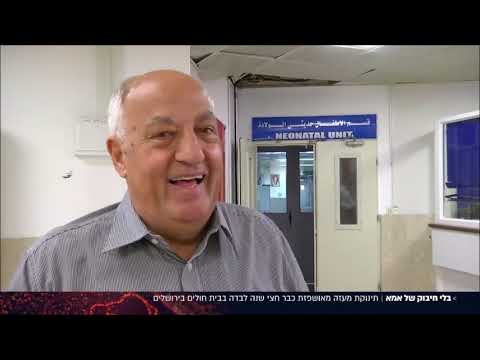There’s so much that’s deceitful about a June 20th Guardian article about a Gaza woman who gave birth to triplets at a Jerusalem hospital that it’s hard to know where to start.
Let’s begin with the headline and strap-line of the article, written by Jerusalem correspondent Oliver Holmes.
First, we believe the wording (parents being “separated from their…children”) is cynically designed to evoke the family separation policy impacting illegal immigrants on the US southern border which has caused so much outrage in the country.
However, there is no such Israeli policy – either de facto or de jure – as a result of the blockade, or any other factor, which causes Palestinian parents to be separated from their children. In fact, quite the opposite is true. COGAT’s policy “requires parents to escort their minor children for medical treatments, based on the understanding that children need their parents in moments such as these.”
The headline and strap line is putatively supported by the Guardian reporter’s claim that, since 2018, six Palestinian babies perished at the Jerusalem hospital without a parent present. Yet, the Guardian doesn’t provide a source, nor provide details on why the parents weren’t present.
In fact, if you recall, claims in May that another Palestinian child, five year old Aisha a-Lulu of Gaza, died alone in a Jerusalem hospital were proven to be false (she died in Gaza), as was the claim that Israel prevented her parents from accompany her for treatment (the parents signed a waiver stating they did not wish to leave Gaza with her, necessitating a family friend to accompany her instead).
So, it certainly seems possible that, of the six babies who allegedly died alone, there were similar circumstances which would contradict the suggestion that Israeli cruelty was to blame.
The current article in question focuses on a 24 year-old Gaza woman named Hiba Swailam, who was pregnant with triplets and admitted to Al Makassed hospital in East Jerusalem after experiencing severe complications. Two of the babies died days after she gave birth. The other baby survived.
However, the crux of the the story – and the basis for the narrative – falls on these sentences:
Hiba Swailam’s permit expired and she had to return to Gaza. She was not there when her first child died at nine days old, or two weeks later when her second baby also died. She was informed by phone.
So, two claims are made here, one implicitly and one explicitly:
- It’s implicitly claimed that Israel forced the woman to return to Gaza, and thus was separated from her babies.
- It’s explicitly claimed that (because Israel putatively forced her to leave Jerusalem) she learned of the death of two of her babies by phone.
On the second point, regarding whether she left Jerusalem before the two babies died, or after, there is conflicting information. Channel 13 journalist Yossi Eli, in both his on-air report and in a statement he gave to our colleague, stated that the babies died whilst the woman was still in Jerusalem, and that she returned to Gaza in order to bury them. The Guardian and the NGO Physicians for Human Rights Israel (PHR-I) claims otherwise, that she left before the babies died.
However, as we argued in a post on an Indy op-ed which made a similar claim, it appears to be completely untrue that Israel forced her to leave. And, this is the most important point. Because, regardless of whether she was in Jerusalem or in Gaza when the babies died, the central Guardian narrative on the babies “dying alone” only carries moral weight if they died alone due to decisions made by Israel. If she left of her own accord, the demonising narrative unravels.
And, in fact, it seems clear at this point, based on all the evidence, that the decision to leave Jerusalem was taken by the Palestinian woman, and her alone. Note this twitter exchange between PHR-I and UK Media Watch where they never make the claim that Israel forced her to leave. Instead, they cite several factors, including the fact that the woman was traumatised by the ordeal. Also, note that the president of President of PHR-I, Professor Rafi Walden, acknowledges, in 2:35 of this Channel 13 news report, that she left because of the “trauma” she experienced, not because she was forced to.
Surely, if Israel was to blame for her early departure, the Professor Walden – the president of a decidedly pro-Palestinian NGO that was intimately involved in the case – would have said so.
Moreover, in addition to the specific Guardian smear regarding the this one case, the Guardian misses the larger point: despite the fact that Gaza is ruled by a terrorist group committed to Israel’s destruction, and that there are a shortage of hospital beds for Israeli citizens, the government still approves tens of thousands of permits to Gaza adults and children – and their accompaniers – each year, allowing them to cross the border and receive medical care in Israel. Only a very small percentage (around 10% of all applicants) are denied – largely, it seems, for security reasons.
In fact, in a classic case of burying the lede, the Guardian obfuscated the fact that the only baby among the triplets born to Ms Swailam in Jerusalem to have survived did so because she received intensive state-of-the-art medical care for six months – the same exact level of care that a Jewish baby would have received.
But, of course, “A Jerusalem hospital where Palestinian babies go to get live-saving care” is not a story that a Guardian Jerusalem correspondent is ever going to write.
Related Articles





